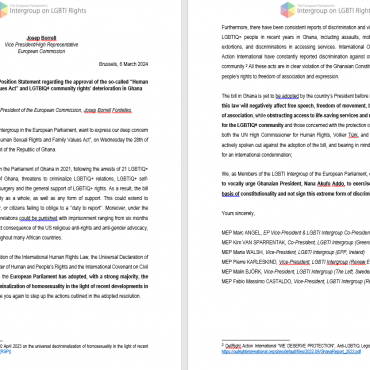63 MEPs call on Hungarian government to revoke Article 33 restricting the rights of trans and intersex persons
Minister of the Prime Minister’s Office, Gergely Gulyás
Minister of Justice, Judit Varga
1357 Budapest
Hungary
Brussels, 15 April 2020
Subject: Request to revoke article 33 submitted under omnibus Bill T/9934, affecting the human rights of transgender and intersex persons in Hungary
Dear Minister of the Prime Minister’s Office, Gergely Gulyás,
Dear Minister of Justice, Judit Varga,
As Members of the European Parliament, we are gravely concerned about the current developments in Hungary regarding the adoption of omnibus Bill T/9934 and the proposed amendments to several laws.
In particular, we draw your attention to the amendments specified in Article 33, which proposes to change in the national registry and identity documents the Hungarian word “nem”, meaning both “sex” and “gender”, with an expression signifying “sex at birth”. The amended phrase would designate primary sex characteristics and chromosomes, recording individuals’ sex by birth in the national registry of birth, marriages and deaths, which could not later be changed. This amendment would deny access to legal gender recognition procedures to transgender and intersex persons in Hungary. Its impact on the lives of persons who are currently medically transitioning is unclear yet equally worrying.
Legal gender recognition procedures are the baseline for protection of transgender persons. They are equally important for intersex persons who are assigned a different sex at birth than the one with which they identify. These procedures secure recognition of transgender and intersex persons’ legal gender by national administrations and afford them protection against further discrimination. Blocking access to these procedures is in clear contravention of European human rights standards and the case-law of the European Court of Human Rights following the Grand Chamber Judgement of Goodwin v. UK.[1] Furthermore, the European Court of Human Rights confirmed in X v. the former Yugoslav Republic of Macedonia[2] Member States’ positive obligation under Article 8 ECHR to provide clear regulatory frameworks for legal gender recognition.
Article 33 of Omnibus bill will ensure that no such procedures are available. Accordingly, it will contravene European human rights recommendations. In 2010, the Committee of Ministers of the Council of Europe[3] recommended that Member States make possible the change of name and gender in official documents in a quick, transparent and accessible way. In 2015, the Parliamentary Assembly of the Council of Europe developed and endorsed on this rationale by calling on Member States to implement the principle of self-determination of transgender persons.[4] In 2019, the European Parliament adopted a resolution on intersex rights stressing the importance of flexible birth registration procedures and encouraging Member States to allow legal gender recognition on the basis of self-determination.[5]
Furthermore, the Hungarian Constitutional Court ruled in June 2018 that recognition of transgender people and their potential name change relates to the fundamental right to dignity.[6] The ruling recognised that changing one’s name is inherently related to changing their gender and the authorities were required to establish a legislation that guarantees the recording of both sex and name change in the official registration without discrimination.
The amendment to the national registry under article 33 of the omnibus bill exposes transgender and intersex persons to increased discrimination, harassment and violence, particularly because the production or presentation of public documents might oblige them to disclose their gender identity recurrently. Its adoption will further restrict fundamental rights and civil liberties of transgender and intersex persons in Hungary.
We urge you, in your capacities as Minister of the Prime-Minister’s office and Minister of Justice, to revoke article 33 of the omnibus bill and to ensure that the Hungarian government provides quick, transparent and accessible frameworks for legal gender recognition, respecting the principle of self-determination and in compliance with European human rights standards.
Yours sincerely,
Heidi HAUTALA, EP Vice-President
Heléne FRITZON, Vice-President, Socialists & Democrats Group
Kati PIRI, Vice-President, Socialists & Democrats Group
Frederick FEDERLEY, Vice-President, Renew Europe Group
Frédérique RIES, Vice-President, Renew Europe Group
Michal ŠIMEČKA, Vice-President, Renew Europe Group
Alice KUHNKE, Vice-President, Greens/European Free Alliance Group
Ernest URTASUN, Vice-President, Greens/European Free Alliance Group
Gwendoline DELBOS-CORFIELD, Vice-President, Greens/European Free Alliance Group
Terry REINTKE, Vice-President, Greens/European Free Alliance Group
Marc ANGEL, Co-Chair, LGBTI Rights Intergroup
Malin BJÖRK, Vice-Chair, LGBTI Rights Intergroup
Maria WALSH, Vice-Chair, LGBTI Rights Intergroup
Sophie IN’T VELD, Vice-Chair, LGBTI Rights Intergroup
Juan Fernando LÓPEZ AGUILAR, LIBE Committee Chair
Birgit SIPPEL, S&D LIBE Committee Coordinator
Evin INCIR, LIBE Committee Member
Ramona STRUGARIU, LIBE Committee Member
Saskia BRICMONT, LIBE Committee Member
Tomas TOBÉ, LIBE Committee Member
Abir AL-SAHLANI, LIBE Committee Substitute
Delara BURKHARDT, LIBE Committee Substitute
Erik MARQUARDT, LIBE Committee Substitute
Hilde VAUTMANS, LIBE Committee Substitute
Nathalie LOISEAU, LIBE Committee Substitute
Olivier CHASTEL, LIBE Committee Substitute
Tanja FAJON, LIBE Committee Substitute
Agnes JONGERIUS
Andreas SCHIEDER
Antoni COMÍN I OLIVERES
Brando BENIFEI
Chrysoula ZACHAROPOULOU
Eleonora EVI
Evelyn REGNER
Francisco GUERREIRO
Giuseppina PICIERNO
Hannah NEUMANN
Irène TOLLERET
Isabel CARVALHAIS
Jakob DALUNDE
Josianne CUTAJAR
Karen MELCHIOR
Kira PETER-HANSEN
Liesje SCHREINEMACHER
Manuel BOMPARD
Marianne VIND
Marie TOUSSAINT
Miapetra KUMPULA-NATRI
Milan BRGLEZ
Mónica Silvana GONZÁLEZ
Pär HOLMGREN
Petra DE SUTTER
Pierre KARLESKIND
Radka MAXOVÁ
Rasmus ANDRESEN
Rosa D’AMATO
Salima YENBOU
Sándor RÓNAI
Sirpa PIETIKÄINEN
Sylwia SPUREK
Tilly METZ
Vera TAX
[1] Case of Christine Goodwin v United Kingdom (2002), Application no. 28957/95.
[2] Case of Case of X v. the former Yugoslav Republic of Macedonia, Application no. 29683/16.
[3] Recommendation CM/Rec(2010)5 of the Committee of Ministers to member states on measures to combat discrimination on grounds of sexual orientation or gender identity (Adopted by the Committee of Ministers on 31 March 2010 at the 1081st meeting of the Ministers’ Deputies).
[4] Parliamentary Assembly of the Council of Europe, Resolution 2048 (2015), “Discrimination against transgender people in Europe”.
[5] European Parliament resolution of 14 February 2019 on the rights of intersex people (2018/2878(RSP)).
[6] Hungary’s Constitutional Court, “Transzszexuális menekült ügyében döntött az alkotmánybíróság” („The Constitutional Court made a decision in the case of a transgender refugee”), 21 June 2018.





